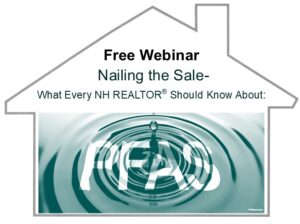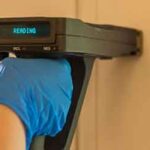ARA Certified for PFAS via Method 533
Absolute Resource Associates has been awarded Primary Accreditation under New Hampshire’s Environmental Laboratory Accreditation Program (NH ELAP) for testing PFAS in drinking water by EPA Method 533.
With this new certification, ARA is now able to offer PFAS analysis for drinking water samples utilizing both EPA approved methods 537.1 (in VT, MA, ME, NH and RI) and 533 (in NH and ME, with other states to be added soon).
According to the EPA, method 533 focuses on “short chain” PFAS, and can be viewed as complimentary to method 537.1. Using both methods, a total of 29 unique PFAS compounds can be effectively measured in drinking water.
In addition to measuring PFAS in drinking water, ARA also offers PFAS analysis for matrices such as surface and groundwater, utilizing our certified LC-MS/MS (isotope dilution) method.
We are proud to be able to say that ARA is the only PFAS Certified Lab located in NH. Analyzing PFAS samples in house allows us to offer our customers great pricing, shorter turnaround times, better communication, access to the chemists running your samples, and excellent customer service. Keeping PFAS testing local has also been a big draw for our customers.
Lower PFAS MCLs became effective in October 2020 for public water systems in NH. If you have questions about which PFAS compounds are regulated in your state, limits, compound lists, ARA’s PFAS testing prices, etc., give us a call or email info@absoluteresourceassociates.com.
Free “PFAS in Drinking Water” Webinar
17 Minute Video for Real Estate Transactions & NH Homeowners
With the regional real estate market booming, it’s no surprise that we’ve had a dramatic increase in inquiries about PFAS testing from real estate agents and their clients. NH is known as a PFAS “hot spot,” and the pollutants are affecting real estate transactions throughout NH and neighboring states. 
In order to help inform local agents and their clients about the issues related to PFAS in drinking water, the PFAS team at ARA has produced a quick and very informative video.
From what it is, to where it is found, and how to tell if your water is safe, this 17 minute video is packed with information and resources for those with questions about PFAS.
Feel free to share the link with your neighbors and any real estate agents in your network: www.bit.ly/PFASvideo
And if you would like to test your own water for PFAS, just swing by our office in Portsmouth, NH to pick up your bottles and instructions.
Do you Need a Lead Inspector or Lead Risk Assessor?
 When faced with the potential of lead paint in a building, do you know the difference between a Lead Risk Assessment, a Lead Inspection, and a Lead Paint Survey? Lead is heavily regulated, and there are some very important distinctions that often cause confusion. The difference between whether you need a lead assessment, lead inspection, or lead paint survey boils down to:
When faced with the potential of lead paint in a building, do you know the difference between a Lead Risk Assessment, a Lead Inspection, and a Lead Paint Survey? Lead is heavily regulated, and there are some very important distinctions that often cause confusion. The difference between whether you need a lead assessment, lead inspection, or lead paint survey boils down to:
– Lead regulations in the state the building is located,
– The specific legal requirements of the project, and
– The intended building use (Kids present? Risk Assessor!)
Lead Risk Assessment
- A Lead Risk Assessment is required for buildings that may be occupied by children under the age of 6.
- You are essentially assessing the lead exposure risk to children spending a significant amount of time in the space.
- A Risk Assessment involves a thorough evaluation of all potential lead hazards, including lead in paint, dust, water, and soil.
- The person performing the assessment must have a valid Lead Risk Assessor’s license.
- If you need a Lead Safe Certificate or Compliance Certificate, you must hire a Risk Assessor (not an Inspector).
- If you are required to provide a Lead Exposure Hazard Reduction Plan (LEHRP), you must hire a Risk Assessor (not an Inspector).
Lead Inspection
- If you are performing demolition or renovation of a building that will not be occupied by children under 6 years old, you can request a Lead Inspection or a Lead Paint Survey (see next section to read about Lead Surveys)
- A Lead Inspection includes testing for lead-based paint, and evaluating the condition of the paint.
- A Lead Inspection may include dust, soil and water sampling.
- Lead Inspectors can perform full inspections, preliminary inspections, and collect dust wipe samples.
- The person performing the Lead Inspection must have a valid Lead Inspector’s license.
- A Lead Inspector cannot issue a Lead Safe Certificate, Certificate of Compliance, or write a Lead Hazard Reduction Plan (LEHRP).
Lead Paint Survey
- If you simply need to identify which, if any, painted components in the building contain lead, a more economical option would be to ask for a Lead Paint Survey.
- A Lead Survey, also called a Lead Determination, is typically part of a pre-demo hazardous materials (hazmat) survey.
- A Lead Paint Survey is limited to the testing of any painted components for lead concentrations.
- A Lead Paint Survey does not include dust, soil, or water sampling (although these services may be performed upon request).
- A Lead Paint Survey does not fulfill Lead Safe or Hazard Reduction requirements. If those are required for your project, you must hire a Lead Risk Assessor.
Lead laws vary by state; be sure to know your local requirements, in addition to the EPA rules, which can be found here: https://www.epa.gov/lead/lead-laws-and-regulations
It’s important to note that individuals may not perform lead inspections, risk assessments, or lead abatement without a valid license. As with any environmental hazard, always consult a certified & trained professional.
For more information visit https://www.epa.gov/lead
The Resource Rambler Newsletter is brought to you by your friends at Absolute Resource Associates. ©


